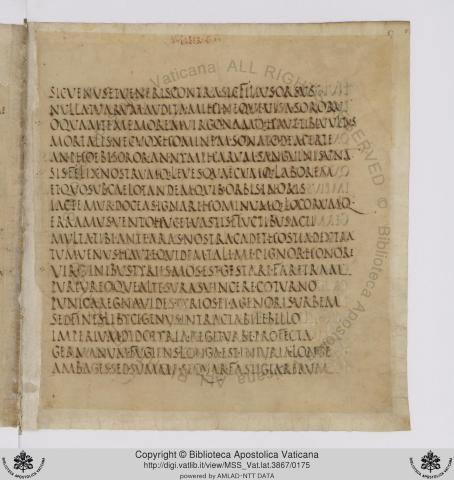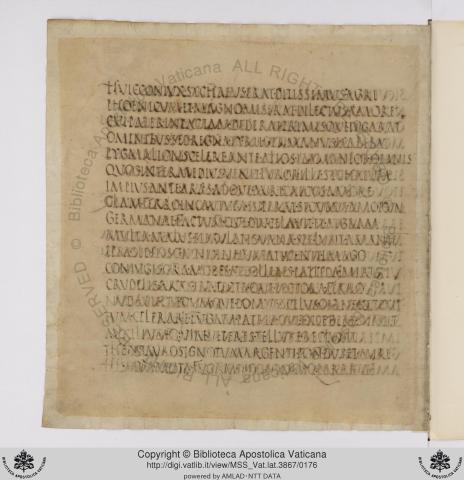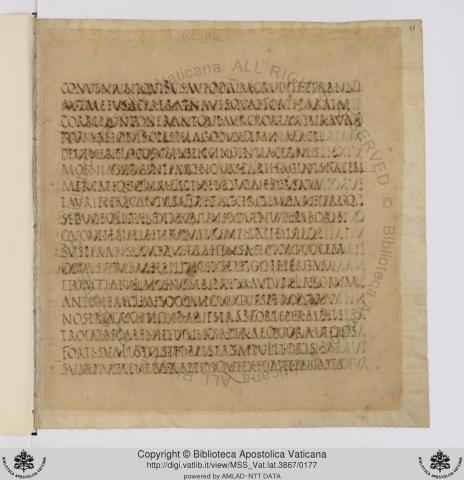Tum Venus: 'Haud equidem tālī mē dignor honōre;335
virginibus Tyriīs mōs est gestāre pharetram
purpureōque altē sūrās vincīre coturnō.
Pūnica rēgna vidēs, Tyriōs et Agēnoris urbem;
sed fīnēs Libycī, genus intractābile bellō.
Imperium Dīdō Tyriā regit urbe profecta,340
germānum fugiēns. Longa est iniūria, longae
ambāgēs; sed summa sequar fastīgia rērum.
Huic coniūnx Sȳchaeus erat, dītissimus aurī
Phoenīcum, et magnō miserae dīlēctus amōre,
cui pater intāctam dederat prīmīsque iugārat345
ōminibus. Sed rēgna Tyrī germānus habēbat
Pygmaliōn, scelere ante aliōs immānior omnēs.
Quōs inter medius vēnit furor. ille Sychaeum
impius ante ārās atque aurī caecus amōre
clam ferrō incautum superat, sēcūrus amōrum350
germānae; factumque diū cēlāvit et aegram
multa malus simulāns vānā spē lūsit amantem.
Ipsa sed in somnīs inhumātī vēnit imāgō
coniugis ōra modīs attollēns pallida mīrīs;
crūdēlēs ārās trāiectaque pectora ferrō355
nūdāvit, caecumque domūs scelus omne retēxit.
tum celerāre fugam patriāque excēdere suādet
auxiliumque viae veterēs tellūre reclūdit
thēsaurōs, ignōtum argentī pondus et aurī.
Hīs commōta fugam Dīdō sociōsque parābat.360
Conveniunt quibus aut odium crūdēle tyrannī
aut metus ācer erat; nāvēs, quae forte parātae,
corripiunt onerantque aurō. portantur avārī
Pygmaliōnis opēs pelagō; dux fēmina factī.
Dēvēnēre locōs ubi nunc ingentia cernēs365
moenia surgentemque novae Karthāginis arcem,
mercātīque solum, factī dē nōmine Byrsam,
taurīnō quantum possent circumdare tergō.
Sed vōs quī tandem? quibus aut vēnistis ab ōrīs?
quōve tenētis iter?' Quaerentī tālibus ille370
suspīrāns īmōque trahēns ā pectore vōcem:
notes
Venus tells him that he is near Carthage, and relates the tale of Dido’s flight from Tyre to Carthage (Storr). Dido had fled from Tyre to escape from the tyranny of her brother Pygmalion, who had murdered her husband Sychaeus (Walpole).
335: Venus: sc. dixit (F-B). equidem: “in truth,” “in fact” (Carter). dignor: as a deponent, signifies “I deem worthy of,” and governs the accusative of the direct object (me), and the ablative of that of which one is deemed worthy (honore) (Frieze). dignor is here like dignus followed by the ablative (Carter) (AG 418 note 1).
336: virginibus: dative of possession with mos est (Carter) (AG 373). Tyriis: the Carthaginians were colonists from Tyre (F-B). gestare: a frequentative verb, indicating repeteated or habitual action (Robertson).
337: purpureo: Tyre was famous for purple dye (F-B). alte: refers to the height of the cothurnuswhich rose more than halfway to the knee (Conington). coturno: the cothurnus or hunting-boot was worn to protect the feet and legs (Walpole) “hunting-boot” or “buskin,” to protect the legs from brambles. It is a Greek word, and means a high Grecian hunting-boot, laced up in the front and reaching to the middle of the leg (Robertson). [need image].
338: Agenoris urbem: “a city of Agenor,” (Walpole). Agenor, who had founded the Phoenician kingdom, was a progenitor of Dido’s (F-B). Agenor was an Egyptian, the father of Cadmus and Europa, and great-grandfather of Dido. He founded the kingdom of Sidon (Robertson).
339: fines Libyci: sc. sunt (Walpole). genus: although grammatically in apposition with fines, relates in sense to the substantive Libycorum implied in Libyci (Frieze).
340: imperium...regit: “wields the sovereignty” (F-B). “holds sway.” Imperium = “empire” (Walpole). urbe: abl. of place whence after profecta (Robertson). Abl. of separation (Carter) (AG 402).
341: longa est iniuria: “long would be the (story of) wrong.”
342: summa...fastigia: “chief heads” (F-B). “The principal events" (Frieze).
343: Sychaeus: the first syllable is long in Vergil only in this one place (Carter). ditissimus auri: “richest in gold.” Vergillimits ditissimus as denoting “fullness,” or “abundance” (Frieze) (AG 409a note).
344: Phoenicum: limits ditissimus (Walpole). Partit. Gen. after the Superl. (Conway) (AG 346). miserae: sc. Dido (Walpole). Dative of agent, like mihi, 326 (F-B) (AG 375a). For ab ea misera (Frieze).
345–346: primis...ominibus: “in the first marriage ceremonies; in her first marriage (Frieze).
345: cui: i.e., Sychaeo (Robertson). pater: Dido’s father was Belus, mentioned below, 621 (Frieze). intactam: “a maiden” (F-B). i.e., “ a virgin” (Robertson). iugarat: syncopated form for iugaverat (F-B).
347: scelere ante alios immanior omnes: “in crime beyond all others (more) brutal.” A strengthened comparative, combining ante alios immanis and aliis immanior (F-B). scelere: abl. of specification (Wetherell) (AG 418).
348: quos: = Sychaeus and Pygmalion (Walpole). inter: the prepositions ante, contra, inter, and propter, are sometimes placed after the relative pronoun, and occasionally after the demonstrative hic (Frieze).
349: impius: especially because he committed the murder ante aras.
350: securus: “careless” (F-B). amorum: objective genitive (F-B) (AG 349d).
351–352: aegram...amantem: “wickedly feigning many a pretence, and with idle hope (of seeing him again) he mocked the heartsick wife” (Walpole).
352: malus: to be taken adverbially (Conington). multa simulans: “with many a pretence.” He had to account for the absence of Sychaeus (F-B). Giving false reasons for the disappearance of Sychaeus (Frieze). spe: i.e., with the hope of seeing him again (Frieze). lusit: = elusit (Carter). amantem: “the fond wife” (Frieze).
353: inhumati: “unburied,” and so despised by the shades, and increasing the enormity of the crime (Walpole). The ghosts of the unburied were supposed to wander about restlessly (F-B).
354: ora modis attollens pallida miris: “raising its face pale in amazing ways.” modis miris is a phrase from the older poet Lucretius (De Rerum Natura 1.123) (F-B).
355: crudeles aras: i.e., the household altars, where he was slain. They are cruel, because they did not prevent the cruel deed (F-B). A personal metaphor; the altars are cruel, as the scene of the murder (Storr).
356: nudavit: “laid bare” (F-B). The ghost seemed in the dream to conduct her to the altar, to show her the instruments and traces of his murder, and then lead her to the place where his treasures were concealed (Frieze). Forms a zeugma with aras and pectora (Jerram). caecum: “secret” or “hidden,” a common meaning in poetry (F-B). domus: genitive (F-B).
357: celerare, excedere: the infinitive instead of the regular construction after suadeo, which is ut with the subjunctive (Frieze) (AG 367).
358: auxilium viae: “as an aid for the voyage.” Viae is an objective genitive (Frieze) (AG 348). tellure recludit: “brought to light from earth” (F-B). tellure is ablative of separation (F-B). Abl. after recludit = e tellure claudit, “ he unburied” = he pointed out where they were buried (Storr). The abl. often follows verbs compounded with re (Robertson).
359: thesauros: hereditary treasures belonging to Sychaeus, the object (349) of Pygmalion’s crime (Conway). ignotum: “untold,” “immense,” because it was such as was before “unknown” (F-B).
360: his: i.e., this revelation (F-B).
361: conveniunt: sc. ei or illi, antecedent of quibus (F-B). Understand omnes as antecedent to quibus (Walpole). odium crudele: “cruel (i.e., relentless) hatred” (F-B). tyranni: The word tryannus in Vergil sometimes seems to bear a neutral sense, but more frequently it occurs in connections which imply the notion of arbitrary if not of abused power. (Conington).
362: acer: “keen” (F-B). quae forte paratae: “that happened to be ready”; already launched and prepared for different destinations (Frieze). paratae: sc. sunt (F-B).
364: Pygmalionis opes: i.e., probably the wealth which became Pygmalion’s when he murdered Sychaeus (F-B). Not actually the treasures of Pygmalion, but wealth which he had expected to secure by murdering Sychaeus (Frieze). pelago: abl. of place (Robertson). dux femina facti: sc. est (F-B).
365: locos: acc. of place whither (Robertson). In prose ad or in would be used (F-B). Terminal accus. after devenere, with the preposition in omitted by poetical license (Chase).
367: mercati: sc. sunt (F-B). facti de nomine Byrsam: “(called) from the deed Byrsa.” facti is genitive of factum. The Phoenician bosra meant “citadel,” but was confused with the Greek word βύρσα, “bull’s hide”; hence probably the myth that the Phoenician settlers bargained with the Libyans for as much ground as could be covered by a bull’s hide. This was cut into very fine strips, which enclosed a large tract of land (F-B).
368: quantum possent: subj. because of the virtual oratio obliqua introduced by mercati sunt (P-H) (AG 592).
369: vos qui: sc. estis (F-B).
370: talibus: sc. verbis (F-B). i.e., talibus (his) verbis respondit (Walpole).
vocabulary
Venus, eris, f.: Venus, goddess of love and beauty, identified by the Romans with Aphrodite, daughter of Jupiter and Dione, 1.411, et al.; (meton.), love, lust, 6.26.
equidem: (adv.), indeed, at least, certainly, surely; w. first person, for my part, 1.238. (demonstr. e or ec and quidem)
dīgnor, ātus sum, 1, dep. a.: (w. acc. and abl.), to deem worthy of, 1.335; w. inf., think, fit, deign, 4.192; p., dīgnātus, a, um, with pass. meaning, deemed worthy of, honored by, 3.475. (dīgnus)
Tyrius, a, um: adj. (Tyrus), of Tyre; Tyrian or Phoenician, 1.12; subst., Tyrius, iī, m., a Tyrian, 1.574; pl., 1.747.
gestō, āvī, ātus, 1, a. and n.: to carry habitually; bear, 1.336; have, 1.567. (gerō)
pharetra, ae, f.: a quiver, 1.323, et al.
purpureus, a, um: adj. (purpura), of purple; purple-colored, scarlet, red, purple, 1.337; of blood, 9.349; ruddy, glowing, brilliant, 1.591.
altē: (adv.), aloft, on high; high, 1.337; high up; deeply, deep; comp., altius, higher. (altus)
sūra, ae, f.: the calf of the leg; the leg, 1.337.
vinciō, vinxī, vinctus, 4, a.: to bind, 11.81; bind round, 1.337; wreathe, bind round, 12.120.
cothurnus, ī, m.: the cothurnus; a triple soled shoe, or buskin, worn in tragedy; a kind of half-boot; hunting boot, buskin, 1.337.
Pūnicus, a, um: adj. (cf. Poenī), Punic, Carthaginian, 1.338.
Agēnor, oris, m.: a son of Neptune and Lyba, king of Phoenicia and ancestor of Dido, 1.338.
Libycus, a, um: (adj.), Libyan, 1.339, et al.; subst., Libycum, ī, n., the Libyan or African sea, 5.595.
intrāctābilis, e: (adj.), that can not be handled or managed; indomitable, invincible, 1.339.
Dīdō, ūs or ōnis, f.: Dido, daughter of Belus, king of Phoenicia, who fled from her brother Pygmalion to Africa, where she founded the city of Carthage, 1.299.
germānus, a, um: (adj.), of the same parentage; particularly, of the same father; own; subst., germānus, ī, m., own brother; brother, 1.341, et al.; germāna, ae, f., own sister; sister, 4.478.
ambāgēs, is, f.: a going about; a winding, 6.29; (fig.), details, particulars, story, 1.342; mysteries, 6.99. (in good usage in the abl. sing. and all cases of pl.) (ambigō, go about)
fastīgium, iī, n.: that which is carried to a point or apex; the apex or point of a pediment; a gable, upper part of a house; roof, pinnacle, battlement, 2.444; slope of a trench; (fig.), chief point, 1.342. (fastīgō)
Sӯchaeus, ī, m.: a Tyrian prince, the husband of Dido, 1.343, et al.
Phoenīces, um, m.: the Phoenicians, 1.344.
dīligō, lēxī, lēctus, 3, a.: to love, 8.590; p., dīlēctus, a, um, loved, dear, 1.344.
intāctus, a, um: (adj.), untouched, unbroken, 11.419; unhurt, 10.504; untouched by the yoke, unyoked, 6.38; pure; a virgin, 1.345.
iugō, āvī, ātus, 1, a.: to yoke; (fig.), join in marriage, unite, 1.345. (iugum)
ōmen, inis, n.: a prognostic, token, sign, omen, 2.182; (meton.), evil, 2.190; auspicious beginning, 7.174; pl., auspices; rites, 1.346; in ōmen, as or for a warning, 12.854.
Tyros (Tyrus), ī, f.: Tyre, the ancient maritime capital of Phoenicia, 1.346.
Pygmaliōn, ōnis, m.: Pygmalion, son of Belus, brother of Dido, and king of Phoenicia, 1.347, et al.
immānis, e: (adj.), vast, huge, immense, 1.110; wild, savage, barbarous, 1.616; cruel, ruthless, 1.347; unnatural, monstrous, hideous, 6.624; (adv.), immāne, wildly, fiercely, 12.535.
veniō, vēnī, ventus: to come, freq.; come forth; approach, 6.755; rise, appear, 1.353; dawn, 10.241; to present one's self or itself, 5.344; descend, spring from, 5.373; impers., ventum est, we, they came or have come, 4.151.
impius, a, um: undutiful in sacred relations; iniquitous, impious, 2.163; nefarious, detestable, perfidious, 4.496; with reference to civil war, 6.612; of actions, 4.596.
clam: (adv.), secretly, 1.350.
incautus, a, um: (adj.), unguarded, heedless, 10.386; unsuspecting, 1.350.
cēlō, āvī, ātus, 1, a.: to hide, conceal, 1.351, et al.
malus, a, um: (adj.), bad; noxious, baneful, poisonous, 2.471; morally, hostile, 3.398; evil, wicked, impious, 1.352; ill-boding; subst., malus, ī, m., a wicked man or person; pl., the wicked, 6.542; comp., pēior, ius, worse.
simulō, āvī, ātus, 1, a.: to make similar; imitate, 6.591; pretend, 2.17; to make a false show of, feign, 1.209; p., simulātus, a, um, made to imitate, counterfeiting, 4.512; dissembling, 4.105; imitating, resembling, 3.349. (similis)
lūdō, lūsī, lūsus, 3, n. and a.: to play, frolic, sport, 1.397, et al.; play with dice, 9.336; make sport of, mock, delude, deceive, 1.352; make one's sport, 11.427.
amāns, antis: (subst.) a lover; loving, fond wife, 1.352.
inhumātus, a, um: (adj.), unburied, 4.620.
modus, ī, m.: a method, 4.294; mode, manner, way, 1.354, et al.; a measure, of song, measure, strain, note, 7.701, et al.; bound, limit, end, 4.98, et al.; fashion, of building, 11.328; abl., modō, in the manner or fashion; like, 9.119.
attollō, 3, a.: to lift or raise up, throw, cast up, 3.574; rear, build, 2.185; (fig.), to rouse, excite, 2.381; with se, lift one’s self or itself, 4.690; come into view, appear, 3.205; (fig.), arise, be exalted, 4.49; (pass.), attollī, to rise, 5.127. (ad and tollō)
pallidus, a, um: adj. (palleō), pale, pallid, 3.217; ghastly, 8.197.
mīrus, a, um: adj. (mīror), wonderful, wondrous, marvelous, 9.304; strange, 1.354; extraordinary, great, 7.57.
crūdēlis, e: adj. (crūdus), unfeeling, ruthless, cruel, inhuman, 2.124; relentless, 1.547; unnatural, 6.24; mortal, deadly, 2.561; bloody, 1.355; bitter, 1.361.
trāiciō, iēcī, iectus, 3, a. and n.: to throw across, over; pass over, cross, 6.536; pierce, 2.273; transfix, 1.355; p., trāiectus, a, um, drawn or passed through, 5.488; transfixed, pierced, 9.419. (trāns and iaciō)
nūdō, āvī, ātus, 1. a.: to make bare, naked; lay open, bare, 1.211; (fig.), expose, 5.586; lay open, disclose, 1.356. (nūdus)
retegō, tēxī, tēctus, 3, a.: to uncover; leave uncovered, unprotected, 12.374; bring to light, reveal, disclose, 1.356; of the sunlight, uncover, unveil, illuminate, 4.119.
celerō, āvī, ātus, 1, a.: to speed, hasten, 1.357, et al. (celer)
excēdō, cessī, cessus, 3, n.: to go out or away; depart, 6.737; flee from, 1.357; withdraw from, 5.380; retire, 9.789.
suādeō, suāsī, suāsus, 2, n. and a.: to advise, warn, urge, exhort, 1.357, et al.; invite, 2.9; impel, prompt, 11.254; compel, force, 10.367.
reclūdō, clūsī, clūsus, 3, a.: to unclose; to open, freq.; throw open, 3.92; reveal, disclose, 1.358; unsheathe, 4.646; cut or lay open, 4.63. (re- and claudō)
thēsaurus, ī, m.: a treasure, 1.359.
ignōtus, a, um: (adj.), unknown, 1.359; strange, 5.795; not well known, but little known, 11.527.
commoveō, mōvī, mōtus, 2, a.: to move completely; move rapidly in procession, 4.301; rouse, start from cover, 7.494; shake, stir, 5.217; disturb, move, 1.126; agitate, terrify 1.360.
tyrannus, ī, m.: a sovereign prince, chief, ruler, 4.320; in a bad sense, a despot, tyrant, 1.361.
corripiō, ripuī, reptus, 3, a.: to take completely or eagerly; to grasp, snatch, seize, catch, 1.45; hurry away, 1.100; tear away; hasten on, take, 1.418; raise quickly, rouse, 4.572; sē corripere, to hasten away, 6.472. (com- and rapiō)
onerō, āvī, ātus, 1, a.: to load; the thing or material with which, usually in abl. and rarely in acc., 1.706; stow, lade, store away, w. dat. of the thing receiving, 1.195; (fig.), burden, overwhelm, 4.549. (onus)
avārus, a, um: adj. (aveō, desire), desirous of gain; greedy; covetous, avaricious, 1.363; rapacious, devouring, (fig.), of the land ruled over by an avaricious prince, 3.44.
pelagus, ī, n.: the sea; open sea, main, 1.138; flood, 1.246.
dēveniō, vēnī, ventus, 4, n.: to come down; arrive at, reach, w. acc. of place, 1.365, et al.
Karthāgō, inis, f.: a city built by Phoenician adventurers on the northern coast of Africa, opposite Sicily, a short distance N.E. of the modern Tunis, 1.13, et al. (Καρχηδών, new city)
mercor, ātus sum, 1, dep. n. and a.: to exchange merchandise; traffic, trade; buy, purchase, 1.367. (merx, merchandise)
solum, ī, n.: the bottom or ground of anything; soil, earth, ground, 1.367, et al.; land, 3.698; foundation, 10.102; the water beneath a ship, as its support; the water, sea, 5.199; support, table, 7.111.
Byrsa, ae, f.: the citadel of Carthage, 1.367.
taurīnus, a, um: adj. (taurus), of a bull or bull's, 1.368.
possum, potuī, posse, irreg. n.: to be able; can, 1.242, et al.; to avail, have influence, power, 4.382. (potis and sum)
circumdō, dedī, datus, dare, 1, a.: to put or throw around; (with abl.), to encircle, surround, encompass, inclose with, 1.368; of dress, gird, 9.462; adorn, 6.207; set, 1.593; border, 4.137; (with dat.), throw around, 2.792; twine or coil around, 2.219; put round, 2.510.
ōra, ae, f.: a margin, border, 12.924; coast, shore, 3.396; region, 2.91; rim, extremity, 10.477; pl., outline, compass, 9.528.
suspīrō, āvī, ātus, 1, n. and a.: to breathe from beneath or deeply; to sigh, 1.371.




